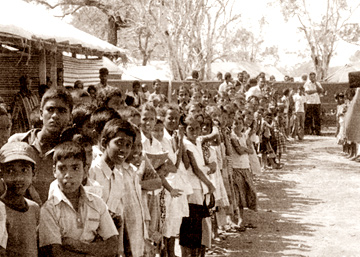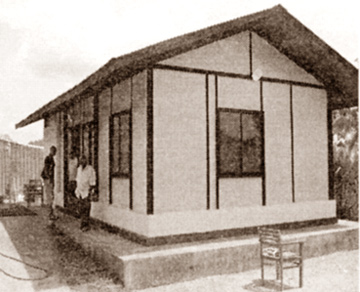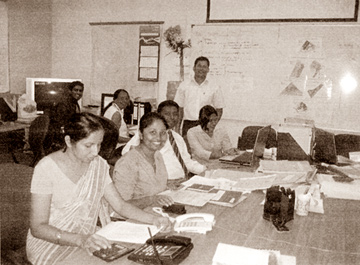|
Healthcare facilities enhanced:
IDP villages ready for all contingencies
by P. Krishnaswamy

Child IDPs |

The Chettikulam Healthcare Centre |

The 24-hour operation room |
Even though the Health Ministry has already provided comprehensive
healthcare facilities to IDPs at the Vavuniya and Chettikulam welfare
villages, arrangements are also being made to enhance the facilities in
preparedness for contingencies during the monsoonal rains, expected in
mid-October, said Dr. Eeshara Kottegoda Vithana, National Coordinator of
the Ministry's Disaster Preparedness and Response Division (DPRD).
As a primary precautionary and disease-preventive measure, the DPRD
is coordinating with the Directorate for IDP Care in Chettikulam in
establishing a strong mechanism to test the water used by the IDPs for
microbial/faecal contamination, he told the Sunday Observer. The present
number of one thousand health volunteers engaged in health education,
which includes messages on water contamination, immunisation, washing
hands and other sanitation measures, would be further increased, Dr.
Kottegoda said.
The sudden rain and flash floods over a five-day period a month ago
in the welfare village areas accorded them an opportunity to identify
all flood-prone areas and, based on that experience, they would be in a
position to handle any eventualities in the monsoonal season, he said.
IDP families in the flood-prone areas would be moved into houses vacated
by departing IDPs in non-flood-prone areas. Umbrellas and gumboots,
where necessary, will also be distributed, Dr. Kottegoda said.
Mortality rates at the welfare villages at present are an average of
two to three per cent which is compatible with mortality rates in any
other part of the country and infectious diseases including diarrhoea,
dysentery, chickenpox, measles, typhoid and hepatitis B which had
increased during the rains experienced some weeks after the mass IDP
influx have been brought under control with the prompt healthcare, water
and sanitation facilities provided by the Ministry. International donor
organisations and NGOs also contributed immensely towards the
humanitarian assistance, Dr. Kottegoda said adding that he was
coordinating with those organisations as well in getting continued
assistance. The current situation with regard to infectious diseases
among the IDPs is also compatible with the normal situation prevalent in
the rest of the country, he said.
The DPRD, established at the Ministry of Health in March this year,
in the wake of the refugee influx, for the healthcare of IDPs was
operational round the clock with eight qualified doctors and fifteen
supplementary staff. The DPRD was in constant contact with the
Directorate for IDP Care at Chettikulam which was also established to
coordinate health and health-related services to the IDPs, ready to move
into action at any eventuality. Two weeks ago, the DPRD reversed to
eight-hour operations consequent to the restoration of normal health
conditions in the IDP welfare villages but, in spite of it, daily
monitoring is being done on mortality rates and infectious diseases for
submitting fortnightly reports to the Steering Committee.
The Steering Committee appointed by President Mahinda Rajapaksa is
chaired by Director General of Health Services Dr. Ajantha Mendis and is
represented by presidents of all professional colleges, all directors
and all heads of departments in the Health Ministry as members, with Dr.
Eeshara Kottegoda functioning as the Convenor of the fortnightly
meetings.
The Steering Committee is the decision-making body with regard to
healthcare of IDPs and all related matters, he said.Explaining the many
healthcare facilities and health related services, he said that:
Sixteen Primary Healthcare Centres and six Referral Centres are
functioning for over 120,000 IDPs with the Chettikulam District Hospital
now having been upgraded as a base hospital with 150 beds. All
facilities, including operation theatre, labour room and labs have been
provided to the hospital. The ratio of healthcare centres for every
8,895 IDPs is proportionate to hospitals in other parts of the country.
One hundred and ten doctors, including two paediatricians, two
Visiting Physicians, Special Medical Officers and MOHs from other
provinces, about 36 nurses, 13 pharmacists, 14 dispensers and 300
volunteers (from among the IDPs) are on duty for the seven IDP zones.
The Referral Centres have facilities to conduct Out Patients
Departments, Day Clinics, Investigation facilities, night on call
facilities, in ward treatment facilities and drug storing facilities. In
addition, six Public Health Nursing staff, 21 PHIs, four Supervising
Public Health Midwives and 43 Public Health Midwives are also on duty.
The Epidemiological Unit has established a data gathering mechanism to
streamline the data on disease surveillance to strengthen the health
system in welfare villages and to identify the ongoing disease pattern.
Mass immunisation programs were also carried out by the unit. Recently
37,500 children younger than five years of age were vaccinated. Donor
agencies and international aid organisations including WHO, UNICEF,IoM,
USAID, and the German Red Cross and countries like India and Italy have
contributed generously towards the humanitarian healthcare of the IDPs.
"The Chettikulam facility is the focal point for health services to
deliver efficient care to IDPs. In this facility, night on calls are
conducted by doctors. A kitchen has been developed to provide meals for
the health staff serving in the IDP zones and the main drug storage
facility is also located in this premises.
Four living quarters complexes have been developed under the
coordination centre to house staff; one for nurses, one for the
paramedical staff and two for the medical officers. One of these is
located within the Kadirgamar Welfare Village which can provide
accommodation to fifty doctors."Communication facilities are improved
with the introduction of CDMA phones to all the centres and all
coordinators. All medical specialists attached to the welfare villages
and Referral Hospitals and Primary Health Care Centres are also provided
with CDMA phones. In the Health Coordination Centre, daily coordination
meetings are conducted with the participation of all relevant officials
to evaluate the prevailing situation and decisions on ground level
issues are taken at the meetings.
The Ministry of Health has established a transport mechanism for IDPs
within and outside the welfare villages for those who need specialised
care and, for this purpose, ambulances are being sent to the different
zones.
ENT clinics, dental clinics, cardiology clinics, dermatology clinics,
special medical clinics, mental health clinics, anti-natal clinics and
eye clinics are also being conducted in the facilities for the IDPs.
|

